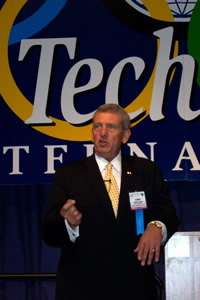Wednesday, May 12, 2004
SIGNAL’s Online Show Daily
TechNet International 2004
Day 2
Quote of the Day:
“Historians will write about what our soldiers have done in Iraq for the next thousand years. Be proud, America.”
—Gen. Tommy Franks, USA (Ret.), former commander of the U.S. Central Command
 |
| Gen. Tommy Franks, USA (Ret.), former commander of the U.S. Central Command, addresses the audience at the Wednesday Plenary Session during TechNet International 2004. |
Day two of TechNet International 2004, AFCEA International’s annual conference and exposition at the Washington D.C. Convention Center, featured a blockbuster address by Gen. Tommy Franks, USA (Ret.), the commander of the U.S. Central Command during the Afghanistan and Iraq wars. Gen. Franks pulled few punches in discussing U.S. shortcomings before the war on terrorism as well as criticizing misconceptions about the current situation in Afghanistan and Iraq.
Gen. Franks decried the partisan politics that defines current discussions of the war on Iraq and the September 11, 2001 terrorist attacks. He related that, when he testified before the commission investigating that day’s attacks, he was asked if he thought the United States should have been better prepared in 2001. His response to them was that the United States should have been cued by the 1983 bombing of the Marine barracks in Beirut, Lebanon, by the first World Trade Center bombing, by the U.S. withdrawal from Mogadishu, Somalia in 1993, by the Saudi Khobar Towers bombing and by the attacks on our embassies in Africa in 1998. He also noted that partisan politics kept many of the new administration’s Defense Department officials from being confirmed by Congress in the first few months of 2001. “Maybe the commission should consider things like that [confirmation holdup] if it wants to see how we should have taken steps to protect America,” he declared.
He left little doubt that he views the Iraq war in the greater context of the war on terrorism. “Your views on Iraq should be formed by where you were when you saw the second airplane hit the World Trade Center on 9/11,” he told the audience. Gen. Franks relates that he met clandestinely with the head of Pakistan’s intelligence service just one day before the 9/11 attacks, and they discussed how to deal with Osama bin Laden and the Taliban. He was flying to meet with Pakistan’s leader when he learned of the attacks on New York and Washington.
The United States had no plan to go into Afghanistan that day, even though bin Laden was considered a direct threat to the United States, “except to toss a few Tomahawks and hope for a good outcome,” the general charged. While he expressed fondness for Tomahawk cruise missiles, he added that “they don’t win wars.”
So he and his staff began drawing up plans to go into Afghanistan and remove the Taliban and bin Laden from power. He cited Operation Enduring Freedom as a great success and decried the lack of recognition of that aspect. “It’s terribly unfortunate that both al Jazeera and the U.S. media just don’t get it,” he said. “We did a good job in Afghanistan. We did what needed to be done for eight years.”
Gen. Franks addressed some of the technology issues that plagued U.S. forces in Iraq. As always, bandwidth is at the top of the wish list. “We are device-rich, but bandwidth-poor,” he observed. While describing the information technology solutions of the past three years as competent, he maintained the need for new ways to increase bandwidth.
He also related the story of how he watched the movement of U.S. forces as icons on a flat screen display portraying Iraq. He noticed one blue icon surging far ahead of the rest of the force as it raced to Baghdad. That armored squad leader was “alone but unafraid” as he raced toward the airport. Guessing that a television reporter might be embedded with that squad, Gen. Franks searched television news channels until he found the reporter describing their dash across the country. At the same time, the division’s commanding general called Gen. Franks to report that he had been in touch with the soldiers in the field, and he could rest assured that the rest of the force would catch up with the unit within 15 minutes. Reflecting on these diverse sources of information that literally took him into the heart of the war, Gen. Franks realized then that he was watching the world that futurists Alvin and Heidi Toffler have described in their writings over the years.
—Scheduled for Thursday at TechNet International 2004: A breakfast address by Michael Wynne, acting under secretary of defense for acquisition, technology and logistics; a luncheon address by Lt. Gen. Edward G. Anderson III, USA, deputy commander of the U.S. Northern Command; and a panel discussion on business continuity and emergency management.




Comments